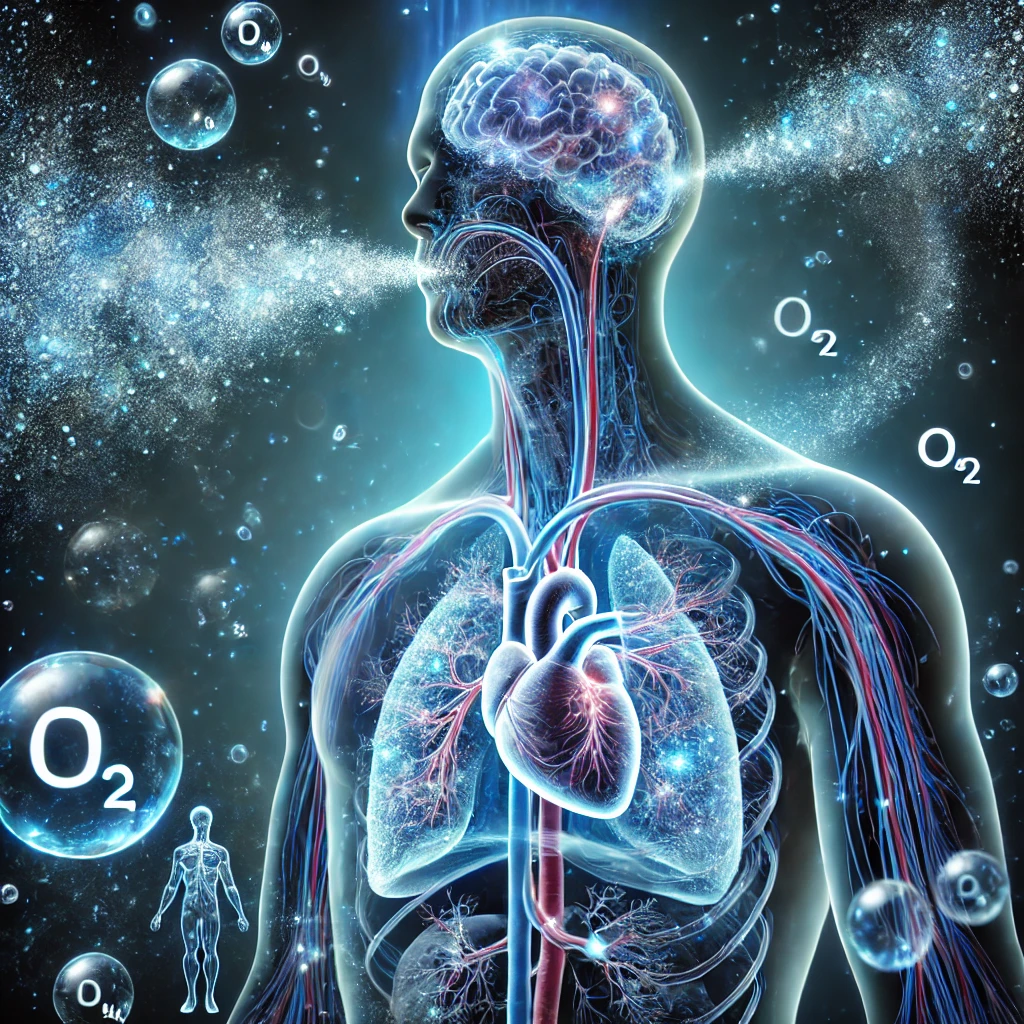Yes, oxygen plays a crucial role in brain function and directly impacts the neural network.

Why Clean AIR matters
The brain is highly oxygen-dependent, consuming about 20% of the body’s oxygen supply despite being only about 2% of total body weight. Here’s how oxygen, or the lack of it, affects the brain’s neural network:
1. Oxygen and Brain Function
- Neuronal Energy Supply: Oxygen is essential for cellular respiration, particularly in the mitochondria of neurons. It enables the production of ATP (adenosine triphosphate), the energy currency of the cell.
- Neurotransmitter Production: Oxygen is involved in the synthesis and regulation of neurotransmitters such as dopamine, serotonin, and glutamate, which influence cognition, mood, and overall neural communication.
- Neuroplasticity: Adequate oxygen levels support neurogenesis (the creation of new neurons) and synaptogenesis (formation of new connections), both crucial for learning and memory.
2. Effects of Oxygen Deprivation (Hypoxia) on the Brain
When oxygen levels drop, the brain’s neural network suffers in several ways:
- Mild Hypoxia (Short-term, Low Oxygen)
- Brain fog & memory issues: Even slight oxygen deprivation can impair cognitive function, making it harder to concentrate and recall information.
- Mood changes: Anxiety, irritability, and depression can increase due to imbalances in neurotransmitters.
- Fatigue & dizziness: The brain slows down non-essential functions to conserve energy.
- Brain fog & memory issues: Even slight oxygen deprivation can impair cognitive function, making it harder to concentrate and recall information.
- Severe Hypoxia (Extended Oxygen Deprivation)
- Neuronal death: Without enough oxygen, neurons begin to die within minutes, leading to brain damage.
- Cognitive decline & neurodegenerative risks: Chronic low oxygen levels (as seen in conditions like sleep apnea) are linked to an increased risk of Alzheimer’s and Parkinson’s disease.
- Loss of consciousness & brain injury: In extreme cases, lack of oxygen leads to coma, stroke, or permanent neurological impairment.
- Neuronal death: Without enough oxygen, neurons begin to die within minutes, leading to brain damage.
3. Hyperoxia (Excess Oxygen) and the Brain
While oxygen is essential, too much of it (hyperoxia) can also be harmful:
- Oxidative stress: Excess oxygen can generate free radicals, leading to oxidative damage in neurons.
- Neuroinflammation: High oxygen levels can trigger inflammation, potentially contributing to neurodegenerative diseases.
4. How to Optimize Oxygen for Brain Health
- Exercise regularly (e.g., aerobic activities like walking or swimming) to enhance oxygen flow to the brain.
- Practice deep breathing techniques such as diaphragmatic breathing or meditation.
- Improve indoor air quality by reducing pollutants and using air-purifying materials (like with Creative Oxygen Labs wall and ceiling coating).
- Ensure good sleep to prevent nocturnal hypoxia, which is common in sleep apnea.
- Stay hydrated since dehydration reduces oxygen transport in the bloodstream.
In short, oxygen is fundamental to maintaining a healthy neuronal network, and both its deficiency and excess can have profound effects on brain function.
What other areas of the body does oxygen affect directly
Oxygen is essential for nearly every biological process in the body. It plays a direct role in cellular energy production, metabolism, and organ function. Below are key areas where oxygen has a direct impact:
1. Lungs & Respiratory System
- Oxygen Exchange: The lungs are responsible for absorbing oxygen into the bloodstream and expelling carbon dioxide.
- Cellular Respiration: Oxygen is needed for every cell to generate ATP (energy), keeping tissues alive and functioning.
- Pulmonary Health: Low oxygen (hypoxia) can lead to conditions like chronic obstructive pulmonary disease (COPD) and pulmonary hypertension.
2. Heart & Cardiovascular System
- Blood Oxygenation: Oxygen binds to hemoglobin in red blood cells, allowing it to be transported throughout the body.
- Heart Function: The heart needs a constant oxygen supply to maintain its beating. Oxygen deprivation can cause ischemia, leading to heart attacks.
- Blood Vessel Health: Proper oxygen levels prevent vascular constriction and support healthy circulation.
3. Brain & Nervous System
- Neural Activity: Oxygen fuels neurotransmitter production and synaptic function.
- Cognition & Mental Clarity: Poor oxygenation can cause brain fog, dizziness, and memory issues.
- Stroke Risk: A lack of oxygen can cause strokes, leading to brain cell death.
4. Muscles & Physical Performance
- Aerobic Energy Production: Oxygen enables muscles to generate ATP efficiently, preventing fatigue.
- Recovery & Endurance: Higher oxygen intake improves recovery times, reduces cramps, and prevents lactic acid buildup.
- Tissue Repair: Oxygen aids in muscle repair and growth after exercise or injury.
5. Skin & Cellular Regeneration
- Wound Healing: Oxygen is critical for cell regeneration and collagen production, which speeds up healing.
- Skin Health: Poor oxygenation can lead to premature aging, wrinkles, and dull skin tone.
- Microcirculation: Oxygen helps maintain healthy blood flow to the skin, reducing inflammation and acne.
6. Digestive System & Metabolism
- Nutrient Absorption: The gut relies on oxygen-rich blood to properly absorb nutrients.
- Detoxification: The liver depends on oxygen for breaking down toxins and metabolizing drugs.
- Microbiome Balance: Oxygen affects the balance of gut bacteria, influencing digestion and immunity.
7. Immune System & Infection Response
- White Blood Cell Function: Oxygen powers immune cells that fight infections and inflammation.
- Antimicrobial Effect: High oxygen environments can kill harmful bacteria and aid in wound healing.
- Oxygen Therapy for Healing: Hyperbaric oxygen therapy is used for infections, chronic wounds, and tissue damage.
8. Kidneys & Detoxification
- Blood Filtration: The kidneys require oxygen to filter waste and regulate electrolytes.
- Acid-Base Balance: Oxygen helps maintain pH levels in the blood.
- Hypoxia & Kidney Damage: Chronic low oxygen can lead to kidney disease and failure.
9. Reproductive System & Fertility
- Sperm & Egg Health: Oxygen is vital for reproductive cell viability and embryo development.
- Placental Function: During pregnancy, oxygen is essential for fetal brain and organ development.
- Hormonal Regulation: Oxygen influences endocrine functions, impacting fertility and menstrual cycles.
10. Bone Health & Regeneration
- Osteoblast Activity: Bone-forming cells (osteoblasts) require oxygen for growth and repair.
- Fracture Healing: Oxygen speeds up the healing process of broken bones.
- Bone Marrow & Blood Production: Oxygen supports red blood cell production in the bone marrow.
Bottom Line
Oxygen is the foundation of life. It affects every organ system, from the brain and heart to the skin and muscles. Insufficient oxygen can lead to fatigue, illness, and chronic disease, while optimal oxygenation enhances energy, healing, and overall well-being.

